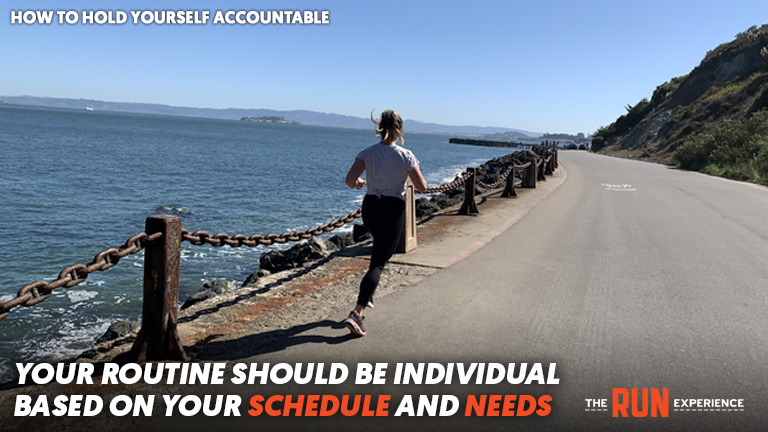7 Ways to Hold Yourself Accountable in Your Run Training

Let’s talk accountability. Embarking on your training journey is exciting, until you wake up one day sore and unmotivated. You skip training that day, and then the next, and eventually you’ve fallen out of your training altogether. I think we’re all ready to break that cycle, no?
Seven Tips to Stick to Your Training Plan
In this article we’ve got seven tips to hold yourself accountable in your run training, even when things get tough.
#1: Build a Routine

A routine will be your #1 accountability buddy. If you’re looking to incorporate a regular workout into your schedule, it will need to become part of a routine. And personal accountability comes from sticking to your routine, one day at a time. Self-improvement comes from keeping the promises you make to yourself.
Your routine should be totally individual to you. While you may be tempted to simply adopt routines you see on social media or Google, know that you will only stick to your routine if it is individual to you. With that in mind, set goals and then build a routine that works those goals in in a realistic way. Each one of your long-term goals can be broken into smaller micro-goals. Those micro-goals are what you want to build into your routine.
Now, when building your routine, be realistic about your non-negotiables. If you don’t honestly see yourself taking care of meal prep before the week begins, acknowledge that and schedule time every day to prepare your meals. If you’re already getting not enough or barely enough sleep, don’t plan to fit your workout in early in the morning if that means getting up earlier.
Once you know which parts of your day are non-negotiable, then find a time to work your training in. If there is not a big enough gap to fit in an entire workout, consider breaking your training into two shorter workouts. Get creative, and be sure you’re not sacrificing anything you’ll need or miss to fit your training in.
#2: Follow the Routine

Successful people do not just build a crafted, individual routine; they then follow it. So, now that we have a routine to work toward our new goal, we need to stick to it. Now, hopefully you’ll be motivated to begin your new routine. However, the motivation will wear off, and that’s when your self-discipline needs to kick in.
A helpful tip to stick to your routine at the beginning is to tell people about it. At least tell people about the training portion of your routine. If you feel comfortable sharing your goals and routine with friends or family or even coworkers, tell a few of them. This way, they can check in on your progress, and you’ll be encouraged to stick to your routine so that you can give a positive report.
If there is no one you feel comfortable telling in your everyday life, consider sharing your routine with an online community. You can find online groups of people also working on self-improvement, and you all can support each other. If some are in your area, you could even schedule meetups to discuss your progress or even to train together.
#3: Allow Yourself to Go On “Auto-Pilot”
Once you form your routine and follow it past the initial motivation period, your body will start to go on auto-pilot. Sticking to your routine will grow easier and easier because it’s simply what you always do. Working in your training takes a lot less mental energy at that point; all you have to do is do what you always do.
Our brains like familiarity. On this point, we had run coach Sarah Silber weigh in. She shared the following:
“Something I have found useful in holding myself accountable is building a routine that sets me up to successfully following through with my workouts, i.e. sleeping in my running/workout clothes so I can get up and go, coffee maker pre-set to have coffee already made as I roll out of bed, doing the same routine (brushing teeth, letting dog out, pouring a cup of coffee) every morning. The more you have a routine, the more you can go on “auto-pilot” and the easier it is to stick to. This same principle can be applied to evening routines as well. Wearing your gym clothes under your work clothes and/or going straight to the gym after the workday without stopping home are two options to make your routine easier to stick to.”

#4: Find an Accountability Partner
This was already discussed above, but holding yourself accountable is so much easier if you involve others. Their role does not need to be big. Find even just one person to be your accountability partner, and really their only job is to talk to you about your goals.
The conversations will likely happen naturally, but at least if someone knows what you’re working towards, you’ll feel more motivated not to let yourself or your accountability partner down. You’re working on yourself for you, but involving someone else and sharing your journey is going to make your work more sustainable and effective.
And if you’re able to find not only an accountability partner but also a training partner, check out this video on ways to keep training fun for both you.
#5: Take Breaks When You Need Them
Next, know that you will have breaks from your routine. If there’s anything covid-19 has taught us, it’s to listen to our bodies if and when we’re not feeling well. And if there comes a day where that’s the case, take the day off and don’t let yourself feel guilty about it.
If you have a vacation planned where your training would require additional effort and accommodations, take the week off. These breaks will allow your body to recover, and help prevent burnout. Just be sure you resume your routine after your break, and hopefully, you can easily go back on “auto-pilot.”
#6: Don’t Let One Day Define You
On a similar note, don’t let one bad day scrap all of your progress. It’s easy to lose major motivation on your goals as a whole when you get sick or injured, or even when you just have a bad training day. But fight this tendency. No one day defines your own work.
Instead, treat every day as a brand new opportunity to continue making progress. Your day is only affected by the previous day if you want it to be. Remember that. If you miss a training session or have a lousy day, it means nothing in relation to your long-term goals. Keep your eyes on the bigger picture on days like this.
#7: Remember Why You Started
Keep your “why” in mind on the days where you don’t want to continue. You began this journey with the right mindset, so incorporate some tools that will allow you to easily get back to that mindset if you need to. Were you reading books that motivated you to get started? Keep them around. Were there certain quotes or tweets that inspired you? Bookmark them. Consider even writing yourself a personal mission statement that you can turn to on the hard days.
Acknowledging that you will have hard times and will lose motivation is a huge step. By acknowledging this, you’re allowing yourself to set up strategies and tools to overcome these slumps. Those slumps are when most people quit, but not you. You won’t because you’ve put in place crutches to help you through until you feel motivated again.
Remember, you are capable of reaching your goals. Now go crush it!
